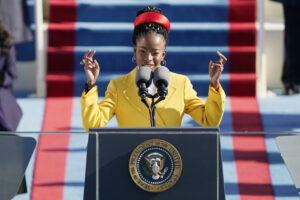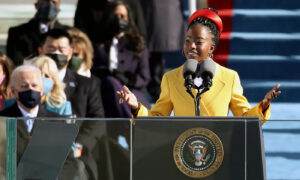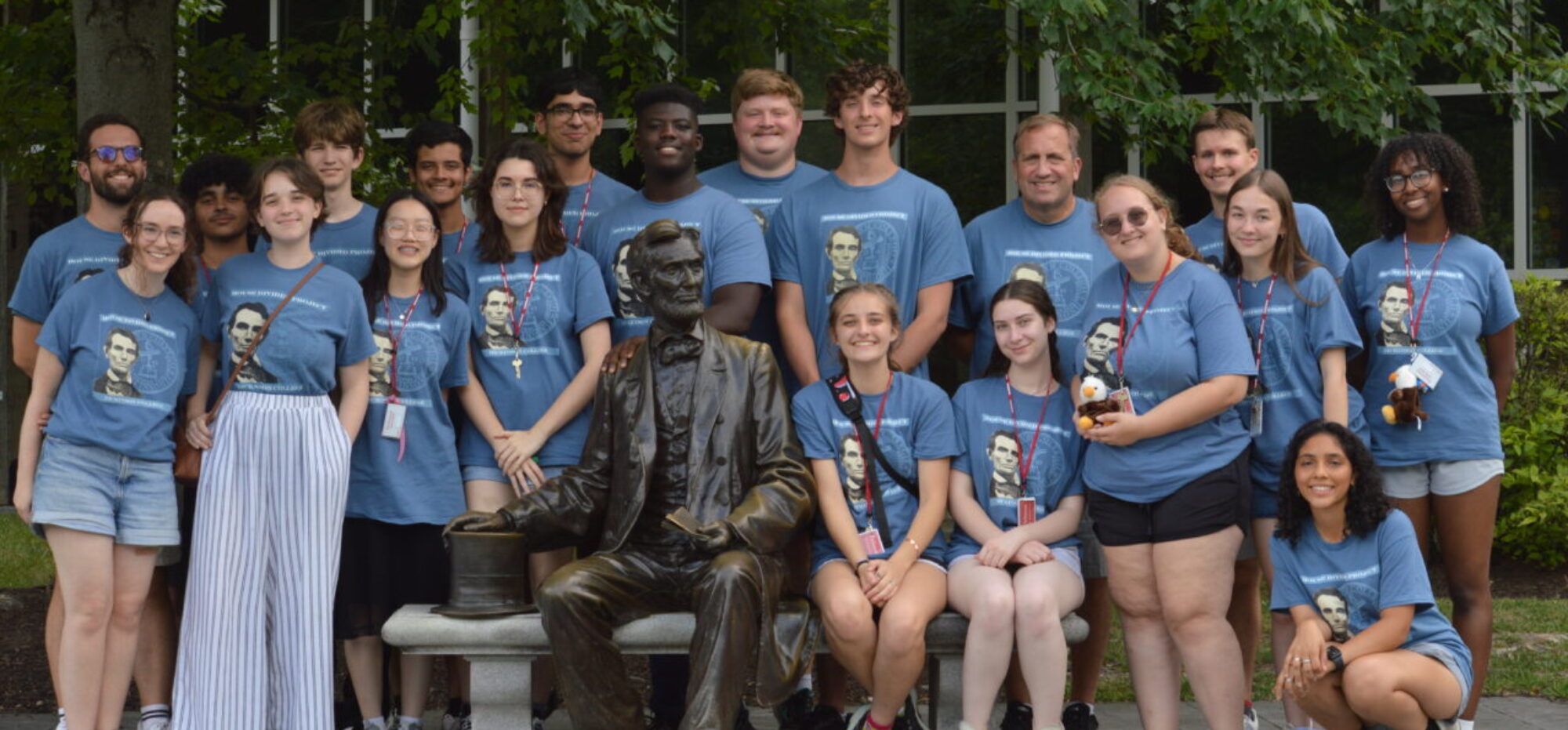But while democracy can be periodically delayed, it can never be permanently defeated. In this truth, in this faith we trust, for while we have our eyes on the future, history has its eyes on us.
INTRODUCTION

Amanda Gorman was only 22 years old when she created a sensation by reading the poem, “The Hill We Climb” at Joe Biden’s presidential inauguration ceremony on January 20, 2021. Gorman had been publishing her poetry since the age of 16. In 2017, at the age of 19, Gorman became the first National Youth Poet Laureate. Only three presidents before Biden had ever asked poets to recite at their inaugural ceremony: John F. Kennedy (Robert Frost in 1961), Bill Clinton (Maya Angelou in 1993 and Miller Williams in 1997), Barack Obama (Elizabeth Anderson in 2009 and Richard Blanco in 2013). Gorman told interviewers afterward that she was still writing the poem for the Biden inaugural when the January 6th insurrection had erupted. She says stayed up late that night and finished in a frenzy of determination.
SOURCE FORMAT: Poem
WORD COUNT: 715 words
When day comes, we ask ourselves, where can we find light in this never-ending shade?
The loss we carry. A sea we must wade.
We braved the belly of the beast.
We’ve learned that quiet isn’t always peace, and the norms and notions of what “just” is isn’t always justice.
And yet the dawn is ours before we knew it.
Somehow we do it.
Somehow we weathered and witnessed a nation that isn’t broken, but simply unfinished.
We, the successors of a country and a time where a skinny Black girl descended from slaves and raised by a single mother can dream of becoming president, only to find herself reciting for one.
And, yes, we are far from polished, far from pristine, but that doesn’t mean we are striving to form a union that is perfect.
We are striving to forge our union with purpose.
To compose a country committed to all cultures, colors, characters and conditions of man.
And so we lift our gaze, not to what stands between us, but what stands before us.
We close the divide because we know to put our future first, we must first put our differences aside.
We lay down our arms so we can reach out our arms to one another.
We seek harm to none and harmony for all.
Let the globe, if nothing else, say this is true.
That even as we grieved, we grew.
That even as we hurt, we hoped.
That even as we tired, we tried.
That we’ll forever be tied together, victorious.
Not because we will never again know defeat, but because we will never again sow division.
Scripture tells us to envision that everyone shall sit under their own vine and fig tree, and no one shall make them afraid.
If we’re to live up to our own time, then victory won’t lie in the blade, but in all the bridges we’ve made.
That is the promise to glade, the hill we climb, if only we dare.

It’s because being American is more than a pride we inherit.
It’s the past we step into and how we repair it.
We’ve seen a force that would shatter our nation, rather than share it.
Would destroy our country if it meant delaying democracy.
And this effort very nearly succeeded.
But while democracy can be periodically delayed, it can never be permanently defeated.
In this truth, in this faith we trust, for while we have our eyes on the future, history has its eyes on us.
This is the era of just redemption.
We feared at its inception.
We did not feel prepared to be the heirs of such a terrifying hour.
But within it we found the power to author a new chapter, to offer hope and laughter to ourselves.
So, while once we asked, how could we possibly prevail over catastrophe, now we assert, how could catastrophe possibly prevail over us?
We will not march back to what was, but move to what shall be: a country that is bruised but whole, benevolent but bold, fierce and free.
We will not be turned around or interrupted by intimidation because we know our inaction and inertia will be the inheritance of the next generation, become the future.
Our blunders become their burdens.
But one thing is certain.
If we merge mercy with might, and might with right, then love becomes our legacy and change our children’s birthright.
So let us leave behind a country better than the one we were left.
Every breath from my bronze-pounded chest, we will raise this wounded world into a wondrous one.
We will rise from the golden hills of the West.
We will rise from the windswept Northeast where our forefathers first realized revolution.
We will rise from the lake-rimmed cities of the Midwestern states.
We will rise from the sun-baked South.
We will rebuild, reconcile, and recover.
And every known nook of our nation and every corner called our country, our people diverse and beautiful, will emerge battered and beautiful.
When day comes, we step out of the shade of flame and unafraid.
The new dawn balloons as we free it.
For there is always light, if only we’re brave enough to see it.
If only we’re brave enough to be it.
CITATION: Amanda Gorman, “The Hill We Climb,” (2021), FULL TEXT via CNBC
DISCUSSION QUESTIONS
- In her combination of candor and hope, about recognizing American injustice and imperfections while also expressing faith in democracy, does Amanda Gorman remind you more of Frederick Douglass or Abraham Lincoln? Or someone else from our curriculum?
- Which phrasing in this poem strikes the deepest chord with you, and why?
- Gorman offered this hopeful vision in 2021 at the Biden inaugural. How might she have rewritten the poem today?
FURTHER READING
- FEATURED COLLECTION: Inaugural Poems in History (Poets.org)
- “How Amanda Gorman Became the Voice of a New American Era” (The Guardian)
- STUDENT CLOSE READING: TBD
